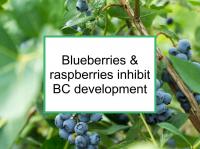A study presented in April at the 2010 annual American Association for Cancer Research (AACR) Meeting in Washington, D.C. has reported that blueberries and black raspberries may prevent breast cancer differently. This result appears to be based on differences in their anthocyanidin and ellagic acid components.
The authors previously demonstrated that berries provided protection against estrogen-induced mammary tumorigenesis in rats. In the current study, rats were administered a diet containing 5% blueberry or black raspberry two weeks before implantation with 17β-estradiol. Rats were killed at three weeks, three months and approximately seven months (when tumor incidence in the control group that did not receive berries reached 80%).
The berry diets were associated with significantly reduced tumor volume (control: 801.2 ± 105.3 mm3; blueberry: 395 ± 97.9 mm3; black raspberry: 461 ± 109.8 mm3) and number (control: 6.9 ± 0.9; blueberry: 4.4 ± 0.6; black raspberry: 4.3 ± 0.6).
Importantly, while blueberry resulted in lower tumor volume than black raspberry, black raspberry was more effective in delaying the first tumor incidence, by five weeks.
While blueberry contains five different anthocyanidins (delphinidin, cyanidin, malvidin, peonidin, and petunidin) and insignificant levels of ellagic acid, black raspberry contains primarily the anthocyanidin cyanidin and high levels of ellagic acid. The authors conclude that the distinct and specific molecular targets and pathways involved in the protective actions of the two berries are derived from their distinct phytochemical signatures.
